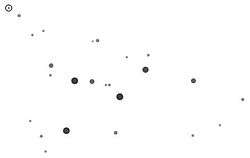Pi Cassiopeiae
Pi Cassiopeiae, Latinized from π Cassiopeiae, is a close binary star[7] system in the constellation Cassiopeia. It is visible to the naked eye with an apparent visual magnitude of +4.949.[2] Based upon an annual parallax shift of 18.63 mas as seen from Earth,[1] this system is located about 175 light years from the Sun.
| Observation data Epoch J2000.0 Equinox J2000.0 (ICRS) | |
|---|---|
| Constellation | Cassiopeia |
| Right ascension | 00h 43m 28.07045s[1] |
| Declination | +47° 01′ 28.3694″[1] |
| Apparent magnitude (V) | +4.949[2] |
| Characteristics | |
| Spectral type | A5 V[3] |
| B−V color index | +0.171[2] |
| Variable type | Ellipsoidal[4] |
| Astrometry | |
| Radial velocity (Rv) | +12.9±0.8[5] km/s |
| Proper motion (μ) | RA: −23.71±0.23[1] mas/yr Dec.: −36.84±0.18[1] mas/yr |
| Parallax (π) | 18.63 ± 0.32[1] mas |
| Distance | 175 ± 3 ly (53.7 ± 0.9 pc) |
| Absolute magnitude (MV) | +1.30[6] |
| Orbit[7] | |
| Period (P) | 1.9642 d |
| Eccentricity (e) | 0.00 |
| Periastron epoch (T) | 2427535.74 JD |
| Argument of periastron (ω) (secondary) | 0.00° |
| Semi-amplitude (K1) (primary) | 120.5 km/s |
| Semi-amplitude (K2) (secondary) | 122.1 km/s |
| Details | |
| Mass | 1.76[8] M☉ |
| Radius | 1.5[9] R☉ |
| Luminosity | 22[10] L☉ |
| Surface gravity (log g) | 4.41[8] cgs |
| Temperature | 8,392±285[8] K |
| Rotational velocity (v sin i) | 40[11] km/s |
| Age | 251[8] Myr |
| Other designations | |
| Database references | |
| SIMBAD | data |
This is a double-lined spectroscopic binary system with an orbital period of nearly two days in a circular orbit.[7] It is classified as a rotating ellipsoidal variable star and its brightness varies by 0.02 magnitudes with a period of 23.57 hours,[4] which equals half of its orbital period. The spectrum matches that of an A-type main-sequence star with a stellar classification of A5 V.[3]
References
- van Leeuwen, F. (2007), "Validation of the new Hipparcos reduction", Astronomy and Astrophysics, 474 (2): 653–664, arXiv:0708.1752, Bibcode:2007A&A...474..653V, doi:10.1051/0004-6361:20078357.
- Høg, E.; et al. (2000), "The Tycho-2 catalogue of the 2.5 million brightest stars", Astronomy and Astrophysics, 355: L27, Bibcode:2000A&A...355L..27H, doi:10.1888/0333750888/2862.
- Cowley, A.; et al. (April 1969), "A study of the bright A stars. I. A catalogue of spectral classifications", Astronomical Journal, 74: 375–406, Bibcode:1969AJ.....74..375C, doi:10.1086/110819.
- Samus, N. N.; et al. (2017), "General Catalogue of Variable Stars", Astronomy Reports, GCVS 5.1, 61 (1): 80–88, Bibcode:2017ARep...61...80S, doi:10.1134/S1063772917010085.
- de Bruijne, J. H. J.; Eilers, A.-C. (October 2012), "Radial velocities for the HIPPARCOS-Gaia Hundred-Thousand-Proper-Motion project", Astronomy & Astrophysics, 546: 14, arXiv:1208.3048, Bibcode:2012A&A...546A..61D, doi:10.1051/0004-6361/201219219, A61.
- Anderson, E.; Francis, Ch. (2012), "XHIP: An extended hipparcos compilation", Astronomy Letters, 38 (5): 331, arXiv:1108.4971, Bibcode:2012AstL...38..331A, doi:10.1134/S1063773712050015.
- Pourbaix, D.; et al. (2004), "SB9: The Ninth Catalogue of Spectroscopic Binary Orbits", Astronomy & Astrophysics, 424: 727–732, arXiv:astro-ph/0406573, Bibcode:2004A&A...424..727P, doi:10.1051/0004-6361:20041213.
- David, Trevor J.; Hillenbrand, Lynne A. (2015), "The Ages of Early-Type Stars: Strömgren Photometric Methods Calibrated, Validated, Tested, and Applied to Hosts and Prospective Hosts of Directly Imaged Exoplanets", The Astrophysical Journal, 804 (2): 146, arXiv:1501.03154, Bibcode:2015ApJ...804..146D, doi:10.1088/0004-637X/804/2/146.
- Pasinetti Fracassini, L. E.; Pastori, L.; Covino, S.; Pozzi, A. (2001), "Catalogue of Apparent Diameters and Absolute Radii of Stars (CADARS)", Astronomy & Astrophysics (3rd ed.), 367: 521–24, arXiv:astro-ph/0012289, Bibcode:2001A&A...367..521P, doi:10.1051/0004-6361:20000451.
- McDonald, I.; et al. (2012), "Fundamental Parameters and Infrared Excesses of Hipparcos Stars", Monthly Notices of the Royal Astronomical Society, 427 (1): 343–57, arXiv:1208.2037, Bibcode:2012MNRAS.427..343M, doi:10.1111/j.1365-2966.2012.21873.x.
- Abt, Helmut A.; Morrell, Nidia I. (1995), "The Relation between Rotational Velocities and Spectral Peculiarities among A-Type Stars", Astrophysical Journal Supplement, 99: 135, Bibcode:1995ApJS...99..135A, doi:10.1086/192182.
- "pi. Cas". SIMBAD. Centre de données astronomiques de Strasbourg. Retrieved 2017-08-30.
This article is issued from Wikipedia. The text is licensed under Creative Commons - Attribution - Sharealike. Additional terms may apply for the media files.
